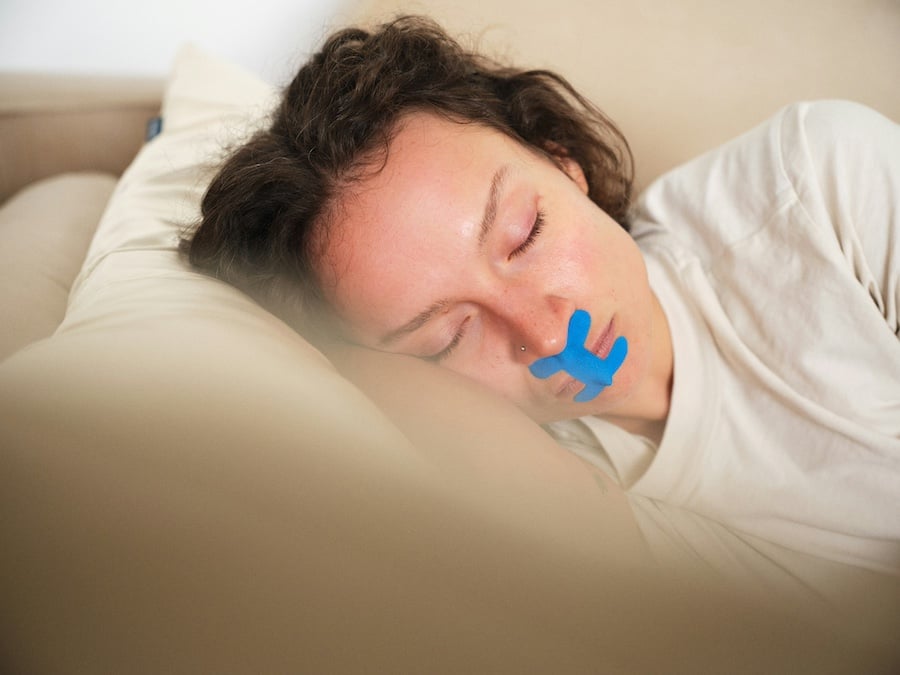Snoring can be more than just a nighttime annoyance; for some, it’s a persistent barrier to restful sleep and rejuvenation. If you’ve tried everything from special pillows to humidifiers and still find yourself (or your partner) struggling, you may have heard about the latest wellness trend: mouth taping.
While we are not medical professionals, this article takes a closer look at mouth taping—exploring how it works, the potential benefits and risks reported, and alternative solutions—to help you better understand this emerging trend.
What Is Mouth Taping?
Mouth taping is a practice where individuals place a small strip of skin-safe tape over their lips before bed. By gently keeping the mouth closed during sleep, the idea is to encourage nasal breathing—which many believe is a healthier and quieter way to sleep.
Advocates say nasal breathing has multiple benefits, such as improving oxygen intake, reducing snoring, and even aiding better concentration the next day. Though a relatively simple concept, the practice has gained significant popularity in wellness circles, especially among those hoping to address chronic snoring.
But here’s the catch: while widely discussed on social media, mouth taping is not an officially endorsed medical treatment, and research backing its effectiveness is still limited.
Why Are People Taping Their Mouths?
Many instances of snoring occur because we breathe through our mouths instead of our noses while we sleep. This mouth breathing can cause the tissues in our throat to vibrate and result in snoring sounds.
By taping the mouth closed, proponents believe they can retrain the body to favor nasal breathing, which in turn could lead to a quieter, more restful night’s sleep. Some people who’ve tried mouth taping report waking up feeling more refreshed, with fewer interruptions overnight.
Still, the experience varies from person to person. For every success story, there’s someone who finds little difference in their sleep quality.
What Does Research Say About Its Effectiveness?
While mouth taping enthusiasts rave about the benefits, it’s worth noting that scientific studies on the practice are sparse. The few existing studies have mostly focused on individuals with mild obstructive sleep apnea (OSA) and yielded mixed results.
For instance, one small study suggests that mouth taping may help reduce snoring by encouraging nasal breathing and altering tongue and palate positioning. However, there isn’t enough evidence to confirm it works for everyone, particularly for snoring caused by other factors, like allergies or sleeping position.
Ultimately, experts agree on one thing: more rigorous research is essential before mouth taping can be considered a reliable, proven solution.
Is It Safe to Try?
The safety of mouth taping largely depends on individual health circumstances and the type of tape used. While some people find it harmless and effective, others experience challenges like discomfort or disrupted sleep.
Potential Risks to Consider:
- Breathing difficulties, especially for individuals with nasal blockages or respiratory issues such as asthma.
- Skin irritation from tape adhesiveness.
- Anxiety or feelings of suffocation, particularly for those trying it for the first time.
- Interrupted sleep due to discomfort or tape-related disruption.
If you’re considering trying mouth taping, it’s crucial to use gentle, skin-safe tape specifically designed for this purpose. Never use strong or industrial adhesives, like duct tape, which can cause pain and skin damage.
Most importantly, consult a healthcare provider if you have any pre-existing conditions. Mouth taping is especially discouraged for children or people with sleep apnea unless explicitly approved by a professional.
Alternatives to Mouth Taping
While mouth taping may intrigue some, it’s not the only approach to addressing snoring or achieving better sleep. Here are a few proven alternatives you might consider trying first.
1. Adjust Your Sleeping Position
Switching from back sleeping to side sleeping can significantly reduce snoring for many people. Specialty pillows designed for side sleeping can help make the transition easier and more comfortable. For even greater support, consider an adjustable bed—our Ultimate Guide to Adjustable Beds explains how customizable positions can help you find the best sleep posture for reducing snoring.
2. Elevate Your Head
Using an anti-snore pillow or slightly elevating your upper body with an adjustable bed can reduce airway obstruction and snoring.
3. Use Nasal Strips
Adhesive nasal strips work by opening up your nasal passages, encouraging smoother airflow and reducing the likelihood of mouth breathing.
4. Run a Humidifier
Dry air can irritate your throat and nasal passages, worsening snoring for some. Adding moisture to the air with a humidifier may alleviate these symptoms.
5. Make Lifestyle Tweaks
Cutting back on alcohol, avoiding heavy meals before bed, or managing allergies may indirectly improve snoring by reducing inflammation and airway restrictions.
Our Takeaway
Mouth taping is undoubtedly an intriguing wellness trend, but it’s not for everyone. For some snoring sufferers, it may provide relief by encouraging nasal breathing and minimizing mouth-induced sound vibrations. For others, it might create more hurdles than solutions.
Before taping your mouth shut each night, consult with your doctor to ensure it’s a safe and viable option for you. Remember, sleep wellness is about taking a holistic approach. Factors such as your sleep environment, bedtime habits, and overall health play just as vital a role in achieving restful nights.
Looking for Sleep Solutions That Don’t Involve Tape?
Say goodbye to restless nights and hello to better sleep! Explore Land of Sleep’s range of mattresses, adjustable beds, and accessories made to help you sleep more soundly and wake up refreshed. Your perfect sleep setup is waiting for you.
Have questions? Contact us today—we’re happy to help! Plus, download our free Mattress Health eBook for expert tips on mattress care, longevity, and creating your ideal sleep environment.





